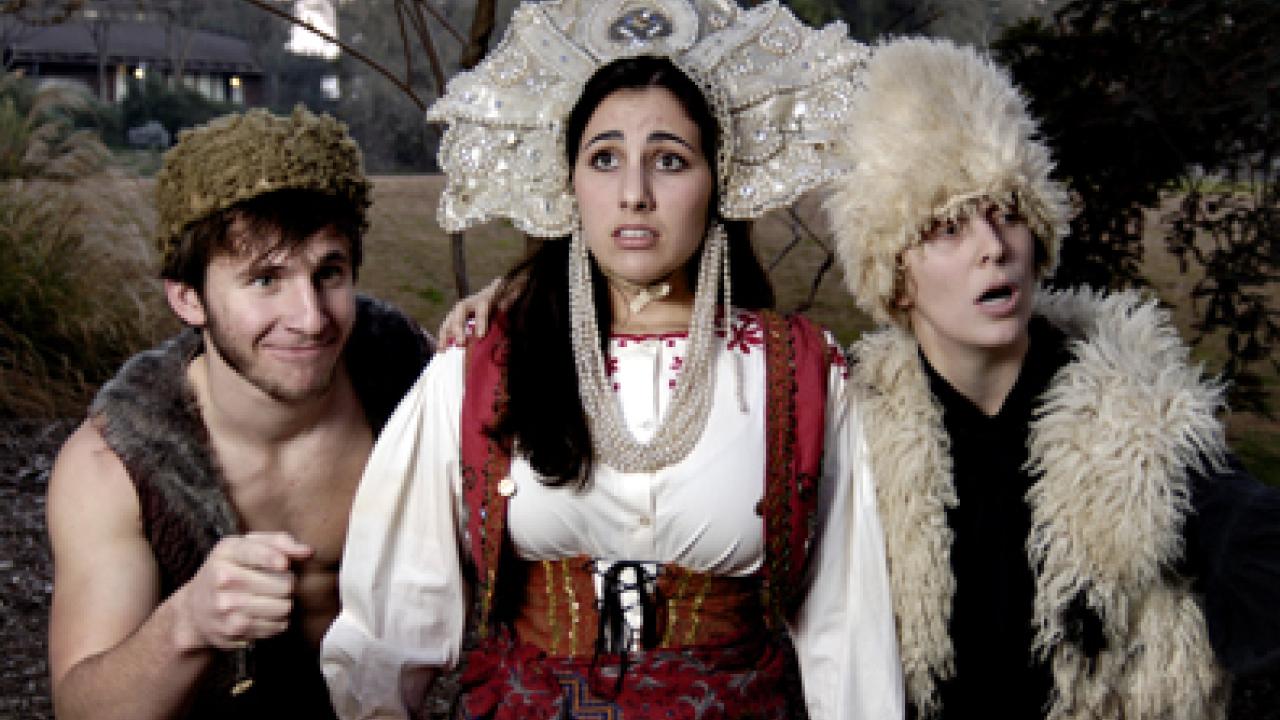“This is Shakespeare flipped!”
“This” is Patricia Miller’s interpretation of The Winter’s Tale, a Department of Theatre and Dance production opening Feb. 13 and running through Feb. 22.
Miller’s The Winter’s Tale is contemporary European “physical theater,” making Shakespeare’s poetry vital, passionate and direct. In other words, she said, this is “not your grandmother’s Shakespeare — there is no pretension.”
Instead, Miller directs her cast to embody Shakespeare’s words, employing a technique that dancers have known for years.
“I love Patricia’s physical theatre direction,” said undergraduate Mark Curtis Ferrando, who plays Clown. “It has presented me with new challenges.
“When you are sad, you tend not to want to move around much, and, when excited, you usually bring your voice up in pitch and speed. I had to find a balance between firm, energetic movements and the melancholy emotional core.”
Miller’s aesthetic, stamped in the English punk era, emerges in an energy that resonates through every aspect of the production, including original Balkan music composed by Daryl Henline, whose beats mimic the popular rhythms of gypsy punk rock band Gogol Bordello.
‘From mourning to hilarity’
The Winter’s Tale, a rarely performed Shakespeare work, features the emotional depth of King Lear (often considered its inspiration) and the raw comedy and rude mechanicals of A Midsummer Night’s Dream, according to a news release from the Department of Theatre and Dance.
“Shakespeare’s emotional range is wide and immediate, running the gamut from mourning to hilarity, with his most famous stage direction, ‘Exeunt pursued by a bear,’” said Miller, a graduating Master of Fine Arts candidate.
Her unconventional production weaves a magical transformation from broken hearts to redemption and death to life. Themes of grief and the healing power of time are expressed in this story of a privileged family torn apart by a patriarch’s possessive rage.
Miller’s direction explores two parallel worlds: the 1930s elegance of a café society destroyed by a paranoid king’s jealousy, and the fertile chaos of a contemporary Bohemian Roma community.
The director said she was drawn to The Winter’s Tale for her MFA thesis because of the exciting clash of these worlds and her personal connection to the subject matter.
“I have spent a long time in the Balkans and maintain a love of that music and culture. I am happy to find in Winter’s Tale a project that embraces that joie de vivre, (and also happy) to explore the emotional formality of my upbringing in England.
“Also, the play’s themes deeply reflect my own experiences of loss and the joys of parenting.”
Direction grips the audience
Assistant Director Julie Friedrichsen, who received a bachelor’s degree from UC Davis in 2008, said Miller’s direction grips the audience: “Patricia approaches every scene as if it were a work of art, a series of extraordinary paintings moving and blending into each other.
“This blurs the lines between actor and audience, art and reality, movement and stillness, order and chaos. She streamlines each moment so that a single gesture of hand or slight turn of the head creates tremendous emotional anticipation.
“There are times when — as a collective body — the audience moves to the edge of their seat, holding their breath until the gesture is complete, and (then) they collectively exhale in relief.”
Josh Steadman’s scenic design reflects the director’s interest in spiritual ritual.
“I used research on the living spaces of nomadic people in Eastern Europe’s Balkan region to create scenic elements including huts that represent pivotal characters. The hut as symbol represents rebirth or the mother’s womb.”
Rounding out the concept artist team: Jacob W. Nelson, lighting designer; Wenting Gao, costume designer; Christian Savage, sound designer; Daniel Jordan, properties designer; and Jenny Estremera and Samantha Whitehouse, stage managers.
Reporting by theatre and dance publicity director Janice Bisgaard.
AT A GLANCE
WHAT: The Winter’s Tale, by William Shakespeare, presented by the Depart-ment of Theatre and Dance
WHEN: 8 p.m. Feb. 13-14 and 20-21, 7 p.m. Feb. 15, 1 p.m. Feb. 19 and 2 p.m. Feb. 22
WHERE: Studio Theatre, Mondavi Center for the Performing Arts
TICKETS: (530) 754-2787 or (866) 754-2787, or www.mondaviarts.org
ADVISORY: The production includes adult language and sexual innuendo.
Media Resources
Dave Jones, Dateline, 530-752-6556, dljones@ucdavis.edu
